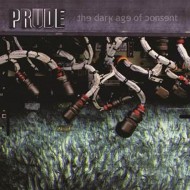 The often used quote “In the future everyone will be world-famous for 15 minutes” is attributed to the bad boy of Pop-Art, Andy Warhol, the man whose Factory bought the world Day-Glo reproductions of soup tins and Marilyn Monroe, as well as being the centre of a circle that included the likes of The Velvet Underground. Some 30 years ago he created hundreds of cardboard box time capsules, the last of which is to be opened soon with one lucky punter paying thirty thousand bucks for the privilege of taking off the sticky tape! Don’t believe me? Check out the BBC’s coverage (http://www.bbc.co.uk/news/magazine-29125003). What does that have to do with anything? Well, whilst some of those boxes have contained ephemera like toe nail clippings, others have contained unique items that have had the art world collectively tenting their skinny jeans; after listening to Prude’s ‘The Dark Age of Consent’, I have a feeling the recording could well have been excavated from one of those very boxes.
The often used quote “In the future everyone will be world-famous for 15 minutes” is attributed to the bad boy of Pop-Art, Andy Warhol, the man whose Factory bought the world Day-Glo reproductions of soup tins and Marilyn Monroe, as well as being the centre of a circle that included the likes of The Velvet Underground. Some 30 years ago he created hundreds of cardboard box time capsules, the last of which is to be opened soon with one lucky punter paying thirty thousand bucks for the privilege of taking off the sticky tape! Don’t believe me? Check out the BBC’s coverage (http://www.bbc.co.uk/news/magazine-29125003). What does that have to do with anything? Well, whilst some of those boxes have contained ephemera like toe nail clippings, others have contained unique items that have had the art world collectively tenting their skinny jeans; after listening to Prude’s ‘The Dark Age of Consent’, I have a feeling the recording could well have been excavated from one of those very boxes.
‘PLUSism’ opens the album with a rambling spoken drone over a wall of garbled instrumentation and electronica like the works of King Missile from back in the day, the lyrics themselves sounding like the drunken stoned diatribe of a critic with Tourette’s syndrome trying to get a handle on the noise. Track two ‘great eraser (in the sky)’ approaches a traditional song structure, the Indy guitar chords and Lou Reed sneer of the verses bracketed by instantly catchy hook laden choruses, whilst ‘darkroom.’ has a stripped back industrial Placebo sound, a vibe that continues into follow up ‘plague star (black light burning)’, but with the drum machine turned up to the Reznor.
A whole host of styles are thrown into a melting pot for the album, coming together is an always bizarre mix. ‘cigarette burn heart’ sounds like Marilyn Manson was having a go at singing the dark Country of Johnny Cash, whilst ‘airlock’ is a future Cyber-Goth anthem, complete with metal machine noise feedback and information technology lyrics, the bastard child of Sigue-Sigue Sputnik and Iggy Pop then being born in the stomp of ‘brief history of fire.’ By the time the simple Stooges swagger of ‘scatterbrain’ comes around it is almost a relief to listen to a simple stripped back song that isn’t throwing curve balls from all directions. Eighties Madchester even gets an ecstasy laced nod in ‘sniper (at the gates of dawn)’ and its John Squire inspired guitars.
Even after repeated listens, I found it hard to get a grasp on the album. Was it pretentious, or was it lampooning the pretention of all too serious art rockers? Are the references to the Hoxton set of ‘knife on mars’ praising or berating the whole scene? I just don’t know. What I do know is that ‘The Dark Age of Consent’ was not metal, and it was never boring! This is not an album for the dyed in the wool head-banger, but if you fancy widening your horizons, give them a go.
(7/10 Spenny)

Leave a Reply